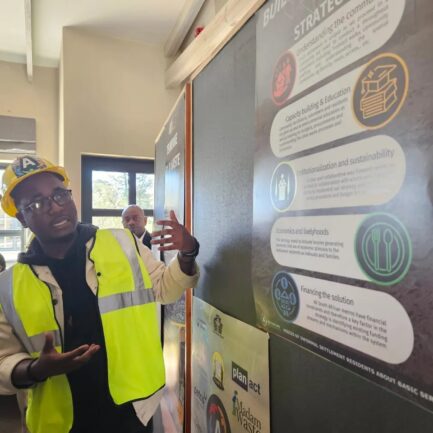Our implementation of the Asivikelane Waste Hub in the City of Tshwane embodies the practical implementation of the bottom-up approach, where informal settlement residents and hostels play a crucial role as key stakeholders in the solid waste management ecosystem.
Often, theories remain as theories, but this hub demonstrates that theories can indeed be realised! In August 2024, the Asivikelane Tshwane Waste Hub Stakeholders presented the Informal Settlement and Hostels Waste Management Strategy to a panel of executives at the City of Tshwane.
The panel included the Environmental Group Head, Divisional Head, Directors and Members of the Mayoral Committee of Environment and Agriculture Management. The Waste strategy aims to positively impact policies regarding sustainable waste management in informal settlements and hostels in the City of Tshwane. This will lead to the allocation of dedicated budgets for waste management in these spatially un-proclaimed areas.
The success of the Tshwane Waste Hub is dependent on collaborative partnerships with officials in the City of Tshwane and their willingness to engage. It is also based on key stakeholders in all elements of the waste cycle. There remains room for new partners to join the Hub as the Waste Strategy develops.
Community-specific waste management:
Zithobeni
In Zithobeni, and Bronkhorstspruit, the Gauteng Department of Agriculture and Rural Development (GDARD) is engaging residents with offers of support to informal waste pickers.
Zithobeni, located in Region 7, within the City of Tshwane, is one of Planact’s most recent partner communities. Situated in the easternmost part of the new Tshwane, it is surrounded by Mpumalanga to the east and north, and Ekurhuleni to the south.
Phomolong
In Phomolong, tailored waste management solutions are being introduced for the community. Initially, some residents did not have access to waste collection bags; however, the City of Tshwane has now delegated the distribution of bags to the Ward Councillor and five Asivikelane volunteers.
These volunteers ensure that each household receives the appropriate number of bags to manage their waste effectively. By involving the community, and providing the necessary resources, the initiative aims to reduce littering and promote a cleaner, healthier environment for everyone.
As the initiative progresses, community feedback will be collected to make the necessary adjustments and improvements. This inclusive approach ensures that the waste management solutions are sustainable and meet the unique needs of Phomolong.

